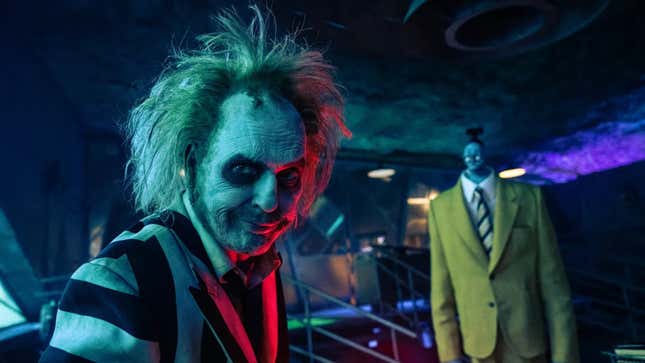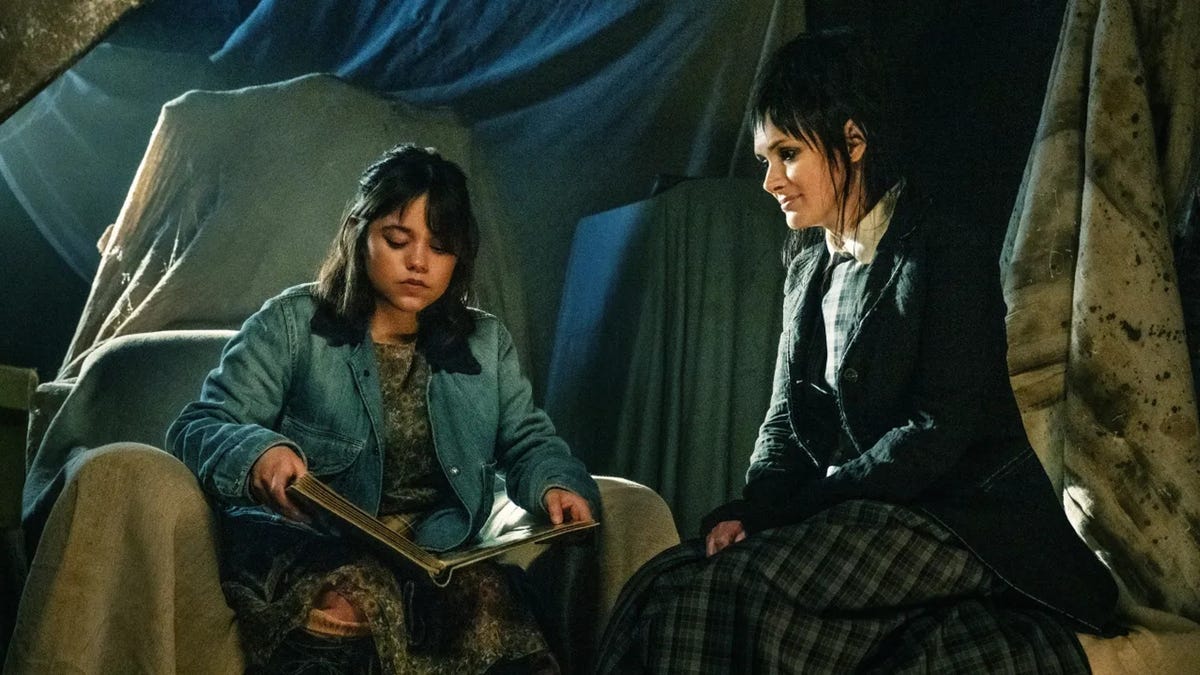Nostalgia has been the driving force behind so many recently released movies, with sequels, prequels, reboots and remakes of films that we love from the past dominating theaters in the last several years. From Ghostbusters to Indiana Jones, Scream to Spider-Man, Twister to Deadpool, It feels like now more than ever, we are desperate to rekindle the joy and laughter from pieces of popular culture’s past. Instead of simply watching the original movies, audiences yearn for a return to beloved characters and the unique worlds they inhabit, wondering what they would be like now.
But these nostalgic retreads face a difficult challenge: They must try to capture the spirit of the original (which usually can’t be done) or outshine it, while also adding something fresh and new. This can either surprisingly succeed or spectacularly fail—unfortunately, Beetlejuice Beetlejuice falls into the latter category. While there are glimmers of the macabre comedy that we’ve come to know and love from director Tim Burton, the majority of the sequel to the 1988 classic feels like you’re on some sort of demented carousel; it just keeps spinning past partial storylines, visual slapstick, and limited character development without ever digging into the emotional core.
Beetlejuice but make it girl power
One of the best aspects of the sequel is that it focuses on three generations of Deetz women. Winona Ryder, who starred in the original film, artfully translates Lydia Deetz’s pensiveness to middle age. While she still sports her signature choppy hairstyle and long, black clothing, her character has evolved into someone far more anxious and distant than the young woman we once knew. She pops pills and has trouble connecting with her daughter, Astrid (Jenna Ortega). Lydia, now a psychic, hosts a television series, using her abilities to communicate with the ghosts that she’s able to see. But lately she’s been haunted by unsettling visions of her teenage demon, Betelgeuse. Lydia has lost a lot of the fire she had as a teen, allowing her to be taken advantage of by her smarmy producer and boyfriend, played by Justin Theroux.
Lydia’s shift from photographer to television star feels slightly out of character because she was always such a loner and quiet presence. But people change, especially decades after being a 16-year-old. It also allows for a cheeky meta commentary that sees Astrid annoyed to be living in her mother’s shadow and wanting to carve out her own story.
Read More: We Ranked Every Tim Burton Movie, Now Including Beetlejuice Beetlejuice, From Worst To Best
Jenna Ortega, with glum expressions, downward-turned mouth, and large eyes, seems like she was made in a Tim Burton factory. As with her lead role in Burton’s series Wednesday, Jenna Ortega is the perfect fit for a new generation of angsty Beetlejuice oddballs. Echoing Lydia’s annoyance with stepmother Delia in the first film, Astrid resents her mother’s psychic abilities and showbiz occupation. She idolizes her father who passed away and fought for important causes like environmentalism.
This dynamic makes her an easy target for Jeremy, a Dostoyevsky-loving teen who’s more than he initially appears. This all sounds like fodder for interesting tension and sharply-drawn characterization, but unlike past Tim Burton films that have a sentimentality as evocative as his visuals, Beetlejuice Beetlejuice mostly relies on exposition and hasty plot contrivances to move everything forward, making the stories feel rushed and superficial. We never stay with the characters long enough to attach to who they are and how they’re feeling. When Astrid ventures into the underworld and conveniently encounters her father, it leads to a family reunion that moves way too fast to have any emotional effect.
Catherine O’Hara returns as the melodramatic Delia, who has moved on from sculpture to multimedia art, which produces some hilarious moments like when she is filming herself trying to capture the perfect primal scream. Beetlejuice Beetlejuice shrewdly sidesteps actor Jeffrey Jones, who played Delia’s husband Charles in the original and whose career ended in a child pornography scandal, with the use of a stop-motion animation sequence to show how he died. The original’s stop-motion sandworms also return, preserving the 1988 film’s cartoony, old-school aesthetic, though ventures into CGI muddy the film’s visual language.

Beetlejuice Beetlejuice binges nostalgia
As the titular character, Michael Keaton is appropriately rambunctious and kooky, but he’s lost some of his bite. The film’s attempts at contemporary humor, which find it mocking therapy-speak and the focus on healing from trauma and addressing one’s inner child, just don’t sting as much as the barbs in the original. Betelgeuse is involved in a plot with a very underused Monica Bellucci as Delores—Betelgeuse’s ex-wife who is part Morticia Addams, part Sally from A Nightmare Before Christmas with a stapled-together body. She looks sexy and menacing while stalking him throughout the underworld, but has little else to do. Her threadbare story amounts to nothing except for a reason to re-stage the wedding scene at the end of the original Beetlejuice with Lydia’s blood-red dress.
Another new face is Willem Dafoe, who fits right into Tim Burton’s eccentric style as Wolf Jackson, an action star who approaches his afterlife cop duties with all the campy gusto he brought to his movie roles. Oddly enough, I got more laughs out of Wolf than I did Betelgeuse. Other jokes, like the painfully obvious, literal soul train and Astrid’s self-referential muttering of“I swear, the afterlife is so random,” weren’t cutting it, either.
Beetlejuice Beetlejuice is more comfortable cramming references to the first film than doing anything different. A child choir sings “Banana Boat (Day-O)” at Charles’ funeral; there’s no earthly reason for this, except to reference the infamous scene. I understand that this is a fantasy comedy, but the sacrifice of storytelling for obvious nostalgia bait was too much.
There’s another lip-syncing scene at the end of Beetlejuice Beetlejuice (and really, how could there not be?) but Tim Burton was never going to be able to top the original’s calypso revelry set to Harry Belefonte. Richard Harris’ lengthy “MacArthur Park” is a delightfully peculiar choice, but it also doesn’t feel earned, just inserted just for the sake of having another musical number.
I might have rose-colored glasses on for the original Beetlejuice, which I grew up watching as a kid, but sitting through Beetlejuice Beetlejuice felt like going to an amusement park as a grown-up: the rides are now worn and clunky and you just want to get off. Beetlejuice Beetlejuice is all flashing lights and bright colors, but little substance.
.

